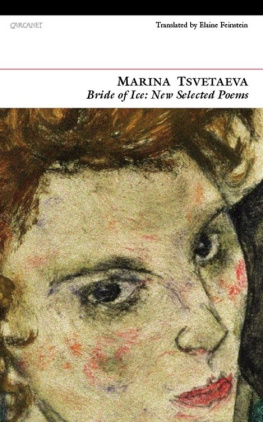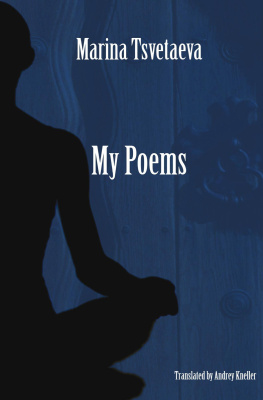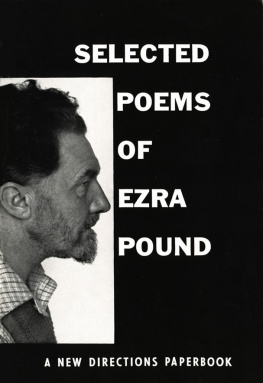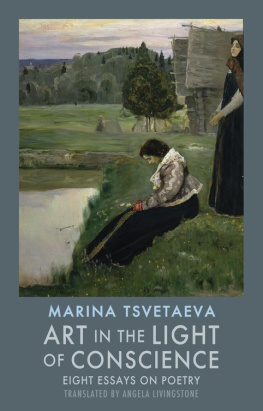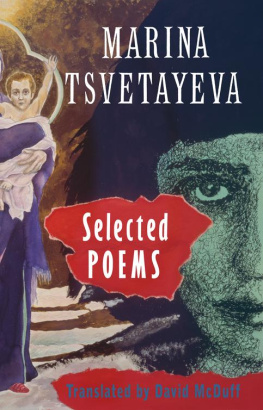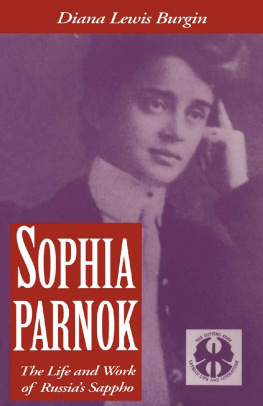The poetry of Marina Tsvetaeva drew me initially through the intensity of her emotions, and the honesty with which she exposed them. In this, she has remained an enduring and exacting mentor. Her themes, too, seemed immediately relevant: her desperate need for love, and the tension between poetry and domestic responsibilities . Over the years I celebrated her dedication to poetry, while hardly touching on the ruthlessness which underpinned her stamina, still less the inner vulnerabilities that lay beneath her wilfulness. In 2008 I invented her as a Virgil to lead me around Stalins Hell in
The Russian Jerusalem. In doing so, I became uneasily aware of elements in her complex personality given greater prominence in other biographies.
This new selection of her poems contains several sequences which suggest the sources of her own inspiration, and her longing for intimacy with poets of equal genius. Marina Ivanovna Tsvetaeva (18921941) was the daughter of a Professor of Fine Arts at Moscow University, and grew up in material comfort. Her mother, Maria, was by far the most powerful presence in the household; a gifted woman, of bitter intensity, she had renounced her first love to marry a widower much older than herself. Her considerable musical talents were frustrated, and she turned all her energies towards educating Marina, her precocious elder daughter. Insistence on hours of music practice and a stern refusal of any words of praise made Marinas childhood unusually austere. When Marina was fourteen, her mother died of tuberculosis, expressing a passionate indifference to the world she was leaving: I only regret music and the sun.
After her death, Marina abandoned the study of music and began to develop her passion for literature. After a mother like that, she reflected, I had only one alternative: to become a poet. Her mother remained in her dreams, sometimes as a longed-for, benevolent figure. In one dream, however, Tsvetaeva meets a bent old woman who whispers surprisingly: A mean little thing she was, a clinging one, believe me, sweetheart. This is the witchy crone of Russian folklore, and we meet her again in Tsvetaevas cruel fairy tale On a Red Horse. By the age of eighteen, Tsvetaeva had acquired sufficient reputation as a poet to be welcome as a house guest at the Crimean dacha of Maximilian Voloshin.
There she met her future husband, Sergei Efron, the half-Jewish orphan of an earlier generation of revolutionaries . At seventeen, he was shy, with huge grey eyes, overwhelmed by Tsvetaevas poetic genius. They fell instantly in love, and his was the most loyal affection Tsvetaeva was ever to find. They were married in January 1912. For two years after their marriage, they were irresponsibly happy together. Seryozha, as he was usually known, was an aspirant writer and a charming actor.
Most people who knew Efron liked him, but some thought him too much under the influence of his wife. He was certainly weak physically he suffered from TB all his life but Irma Kudrova, recently allowed access to files of his 1940 NKVD interrogations, has uncovered a man of unusual courage and integrity. When war came in August 1914, Seryozha was eager to enlist, and was sent initially to the front line as a male nurse in an ambulance train. Soon afterwards, Tsvetaeva fell in love with Sofia Parnok, a talented poet from a middle-class Jewish family in the Black Sea port of Taganrog. Tsvetaeva had been wildly but innocently attracted to beautiful young girls in her early adolescence, but Parnok was an open lesbian. She was not exactly beautiful, but she possessed a sexual assurance which had never been the main bond in Tsvetaevas affection for Seryozha.
Tsvetaeva was well provided for since her fathers death in 1913, and for fifteen months she threw herself into her passion for Parnok, with little thought for her husband and two-year-old child. She and Parnok travelled brazenly over the wilds of Russia together and even visited Voloshins dacha. The lyrics for Parnok are both more sensual, and less tormented, than other love poetry written by Tsvetaeva. Sergei had a brief love affair of his own. In Parnoks poems for Tsvetaeva, she describes her as an awkward little girl, but her claim to have been the first to give Tsvetaeva intense sexual pleasure may have been no more than a boast. In any case, as the affair came to an end, it soon became clear that it was to Seryozha that Tsvetaeva felt the strongest bond.
When the Revolution came, she was in hospital giving birth to their second child. Separated from him in the confusion at the start of the Civil War, she wrote in her diary: If God performs this miracle and leaves you alive, I will follow you like a dog. Through the Moscow famine, Tsvetaeva and her two children lived in Boris and Gleb Lane, in unheated rooms, sometimes without light. She and Efron were to be separated for five years. In those years, she and her elder daughter, Ariadne, were almost like sisters. Alya, as she was usually called was as precociously observant a child as Tsvetaeva had been herself.
This is how she writes of Tsvetaeva: My mother is not at all like a mother. Mothers always think their own children are wonderful, and other children too, but Marina doesnt like little children She is always hurrying somewhere. She has a great soul. A kind voice. A quick walk. She has green eyes, a hooked nose and red lips Marinas hands are all covered with rings she doesnt like people bothering her with stupid questions The family fared badly in the Moscow famine.
Marina was unskilled at bartering trinkets for food, and she and Alya often lived on potatoes boiled in a samovar. They sometimes went out on a sledge together in the freezing cold to exchange bottle tops for a few kopeks, often leaving the younger child, Irina, strapped against a table leg to prevent her coming to harm. When starvation looked imminent in the winter of 1919-20, Tsvetaeva put both children into the Kuntsevo orphanage, which was thought to be supplied by American food aid. When she arrived on her first visit, Alya was running a high temperature and Tsvetaeva, frightened, took her home to nurse her. Alya pulled through but Irina died of starvation in the orphanage in February 1920. Tsvetaeva was unable to make herself go to the funeral.
She blamed Seryozhas sisters, probably unfairly, for refusing to help her, claiming they had behaved like animals. She told all her friends to write to Seryozha that the child had died of pneumonia rather than hunger. There was much gossip about her own neglect of the child. Certainly, she was never as close to Irina as to Alya. The following year was taken up by a new infatuation Yevgeny Lann, a poet friend of her sister Asya a humiliating rejection by him, and anxiety about Seryozha as the defeat of the White Army loomed closer. In January 1921, Tsvetaeva wrote a poem of pitiless inquiry into the nature of her own inspiration: On a Red Horse.

